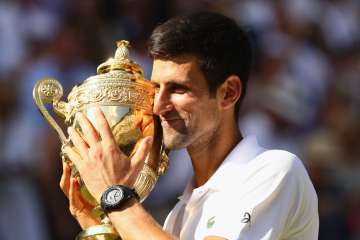Novak Djokovic rejoins Roger Federer, Rafael Nadal in top 3 after winning Wimbledon 2018
That trio has combined to win 10 of the past 14 championships at Flushing Meadows: Five for Federer, three for Nadal, two for Djokovic.

What had gone from a Big 4 to a Big 2 is now back to a Big 3, with Novak Djokovic rejoining Roger Federer and Rafael Nadal at the top of men's tennis.
Each has been written off at some point. And each has won a major tournament in 2018: Djokovic's title at Wimbledon on Sunday, Nadal's at the French Open in June, and Roger Federer's at the Australian Open in January.
"It's amazing," Djokovic's coach Marian Vajda said, "that those three got back like this."
Maybe the U.S. Open, which starts in 1½ months, will break the tie for season supremacy. That trio has combined to win 10 of the past 14 championships at Flushing Meadows: Five for Federer, three for Nadal, two for Djokovic. At least one, and sometimes two, appeared in 13 of the finals in that span.
Federer, who turns 37 on Aug. 8, won that event every year from 2004-08 but not since. Nadal, 32, is the reigning champion.
Djokovic, 31, sat out the U.S. Open while missing the last half of 2017 because of an injured right elbow that he eventually had surgery on.
He announced his return to prominence and ended a Grand Slam title drought that lasted more than two years by overwhelming Kevin Anderson 6-2, 6-2, 7-6 (3) in the final at the All England Club. While Djokovic was having his problems, Federer and Nadal combined to win six majors in a row, a streak that ended at Wimbledon.
Anderson, last year's runner-up at the U.S. Open, was impressed by the quality he's seen from Djokovic — both on Sunday and when they practiced with each other of late.
"Guys at the top can expect to see him on the other side of the net quite frequently," Anderson predicted.
And why not?
The 31-year-old Djokovic is, remember, someone in possession of 13 Grand Slam titles, the fourth-most in history for a man. He trails only contemporary rivals Federer (20) and Nadal (17), along with childhood idol Pete Sampras (14). Djokovic is also the only man since Rod Laver's second calendar-year Grand Slam of 1969 to win four consecutive majors, a run he completed at the 2016 French Open.
He hadn't won a Slam since, until Sunday.
Andy Murray, a three-time major champion and two-time Olympic singles gold medalist, is the fourth member of the Big 4, but he's been sidelined for most of the last year because of a bad hip that needed an operation. When Djokovic was out, too, the quartet was cut in half.
For the time being, it's a trio.
"I understand that people are questioning whether I can consistently play on this level. Trust me, I am, too. At the same time, I can't look too far on the road because I have to embrace and cherish this kind of accomplishment," Djokovic said.
"This is going to be a huge confidence boost and springboard for whatever is coming up," he added. "I really can't see the future. I don't know what's going to happen. But I like to play on hard courts. U.S. Open was always a successful tournament for me."
That's certainly true.
In his past 10 appearances, he never did worse than reaching the semifinals. He made the final seven times in that stretch.
And now, after a difficult period, hampered first by a painful elbow and then by self-doubt, Djokovic looks far more like his old self these days.
Vajda, the former coach who returned to Djokovic's side in April, saw something important over the past two weeks.
"Definitely, he is more relaxed. But he's also enjoying. He started enjoying," Vajda said. "This is the most important moment. ... He lost this doubting and fear and whatever, so he's able to enjoy."
Before beating Anderson, Djokovic had to get past Nadal in the semifinals. It was as enthralling and high-quality a match as any during Wimbledon, a 5-hour, 15-minute tussle between two greats that ended 10-8 in the fifth set.
Djokovic called it "the biggest test that I could have ... just to see whether I can prevail" and said he derived plenty of confidence from that victory against a man he's now faced 52 times.
Nadal's takeaway?
Djokovic, he said, is "playing at his top level again."
Anderson's coach, Brad Stine, agreed with that assessment.
"It's good for the game," Stine said. "It's great to have a guy like Novak be able to come back."
Only after collecting his fourth Wimbledon trophy can Djokovic really appreciate the hard times and understand how they helped him in the long run.
"There were several moments where I was frustrated and questioning whether I can get back (to the) desired level or not," he said. "But that makes this whole journey even more special for me."
(With AP Inputs)